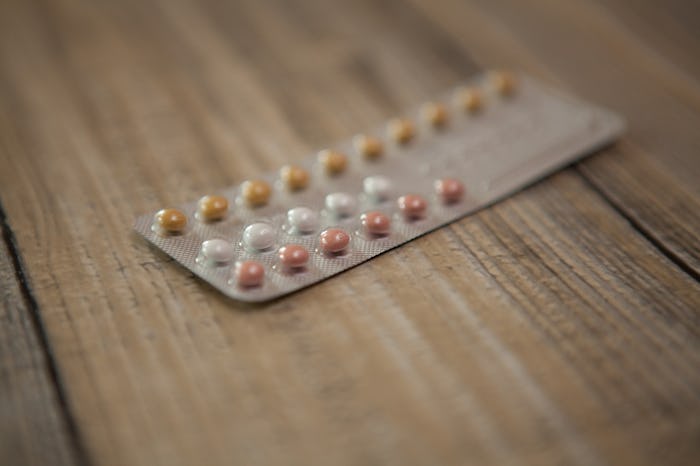Life
Birth Control & Suicide Might Be Linked, New Study Says, But Don't Freak Out
It's a well-known fact that hormonal birth control comes with a set of potential side effects, which usually last only two to three months. Some people on the pill may experience sore breasts, nausea, headaches, or spotting between periods, among other possible issues. But there's one side effect that scientists continue to debate: Whether or not hormonal birth control can cause depression. There's no conclusive research on the matter, and a new study on the link between birth control and suicide doesn't tell the full story, either.
A team of researchers in Denmark spent about eight years tracking nearly half a million Danish women and their hormonal birth control use, including the pill, the patch, and the vaginal ring, according to TIME. What they found is that the risk of attempting suicide for women on birth control was nearly twice that of those who weren't on birth control, while the risk of dying by suicide was more than three times as high for birth control users, according to the study, which was published in the American Journal of Psychiatry. Young girls represented the greatest relative risk.
Those findings seem alarming on paper, but once you dig into the study, you quickly realize the correlation — and concern — may be overblown.
The researchers only identified 71 people who died by suicide, according to the Sacramento Bee. (It should be noted that researchers did identify nearly 7,000 first suicide attempts among the participants taking birth control.) Although the findings show a difference in relative risk, 71 cases out of nearly half a million hardly seems like an extreme enough number over which to ring alarm bells. But that still hasn't stopped the study's lead author, Charlotte Wessel Skovlund, from suggesting that physicians limit hormonal birth control prescriptions.
In particular, Skovlund told TIME,
Women and their doctors should be aware about mood reactions as a potential side effect, so they can quit their hormonal contraception if they feel affected. Doctors should be more reluctant to prescribe hormonal contraception to young girls unless there are medical reasons to do so.
Numbers aside, the study doesn't also take into account external factors that may affect the emotional and mental health of women taking hormonal birth control. As Karin Michels, professor and chair of epidemiology the University of California-Los Angeles, told TIME,
For them, they are still more insecure in relationships and may suffer more from breakups, unhappy events and things like that.
Whether or not birth control causes depression is a controversial topic among medical circles. A pilot study published in 2007 found that women using the pill were "significantly more depressed" than those women who were not on birth control. But these findings were debunked by an Archives of Gynecology and Obstetrics (AGO) study determined that depression is, in fact, not a common birth control side effect, and that the correlation between mood changes and the pill remains unclear.
Furthermore, the AGO study noted that many of the approximately 12 million women in the United States who live with depression are also taking birth control, which could partly explain why researchers see the two coincide in their analyses. Plus, a 2013 study published in the American Journal of Epidemiology has shown that hormonal birth control could actually help reduce symptoms of depression and other mood disorders. That research alone should make it difficult to conclusively say contraception causes mood changes in some users.
This isn't to say that hormonal birth control may not have an affect on your mental health. Rather, it's to say that the so-called evidence is not as cut and dry as the Danish researchers, or reporters covering the study, make it seem.
Check out Romper's new video series, Romper's Doula Diaries:
Watch full episodes of Romper's Doula Diaries on Facebook Watch.
